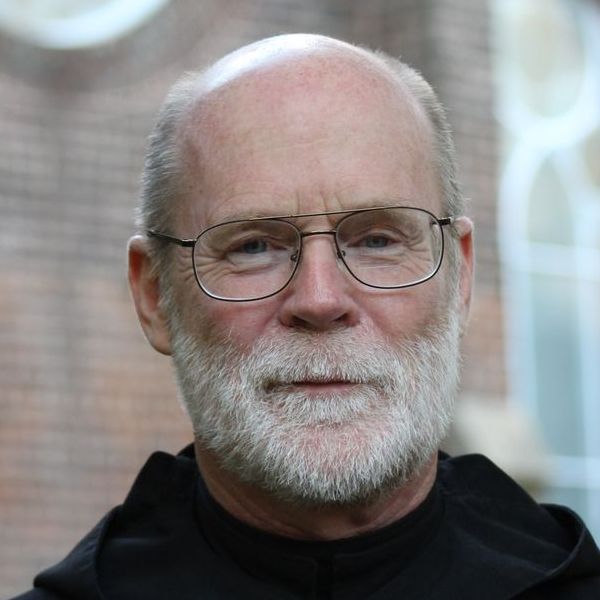Whether you have questions about discernment and vocations or want general information about Belmont Abbey, we invite you to reach out and ask!
Homilies

June 24, 2019
Corpus Christi, June 23, 2019

We celebrate today the day the church has set aside to contemplate the great mystery of the Eucharist, the Body and Blood of Christ. It might seem strange that we have a feast set aside precisely to celebrate the Holy Eucharist. After all, the church gathers each Sunday to celebrate the Eucharist. And yet it seems that there has been some confusion in recent years among Catholic Christians regarding the Eucharist and the church’s faith that in the bread and wine offered and consecrated in the Mass, there is the true and real sacramental presence of the very Body and Blood of the Lord Jesus Christ.
Perhaps the more fundamental crisis in faith regards Jesus himself. We believe, as we will soon profess again in the Creed, that Jesus Christ is the Son of God who, to save us from sin and death, took on human nature, died on the cross and rose again from the dead, never to die again. He is the Lord, the Savior of the world. Our Christian faith is, first and foremost of all, a trust in and a dedication to Jesus, who saves us from our sin and everlasting death, and thus assures us that each of our lives is precious and has a meaning a purpose which lasts forever. But that faith is challenged by the presuppositions of the modern world. How can a man be God? The very particularity of it offends our illusions of inclusivity and tolerance, which we like to think to be the epitome of humankind’s advance. In like way, we struggle to trust that what appears as bread and wine is in a unique way, by the power and word of Almighty God, the Body and Blood of Jesus Christ, which has the power to save us, give us everlasting life and is worthy of all worship and adoration.
Yet that is what we have been taught today by the Apostle in his First Letter to the Christians in Corinth: Brothers and sisters, I received from the Lord what I also handed on to you, that the Lord Jesus, on the night he was handed over, took bread and, after he had given thanks, broke it and said, ‘This is my body that is for you. Do this in remembrance of me’. In the same way also the cup, after supper, saying, ‘This cup is the new covenant in my blood. Do this, as often as you drink it, in remembrance of me.’ And so we have gathered on this, the Lord’s Day, the day Jesus rose triumphant from the dead, to do once again what St. Paul and all those who have gone before us have done in an unbroken tradition from those first days of the church until today, obedient to the words of Jesus: Do this in remembrance of me. And we believe that, through the will of Jesus and the working of the Holy Spirit, the bread and wine we offer will become the life-giving Body and Blood of the Savior.
This is as difficult a challenge for us as it was for those who followed Jesus one day in Capernaum, when he told them: Whoever eats my flesh and drinks my blood has eternal life, and I will raise him on the last day. For my flesh is true food, and my blood is true drink. John’s Gospel tell us that many of his disciples who were listening said: ‘This saying is hard; who can accept it?…As a result of this, many of his disciples returned to their former way of life and no longer accompanied him. Which disciples do we wish to follow: the ones who turned back and no longer followed him, or St. Paul, the Apostles, and all those who uninterruptedly down to the present have passed on the church’s faith in this great sacrament?
Because we are gathered here, we are indeed wishing to hold fast to the faith, first given by the Lord to his own disciples, and which has been handed down through the generations to us. The divinely inspired Scriptures, likewise handed down to us, teach us today what it is we celebrate in this Eucharist. In the first reading, from the Book of Genesis, we meet the mysterious figure of Melchizedek. King of Salem and priest of God Most High. He goes to meet Abram, who is returning from a great victory of enemies who had attacked and carried off members of Abram’s family into captivity and slavery. Melchizedek offers bread and wine and blesses Abram. The Letter to the Hebrews in the New Testament sees Melchizedek, who is mentioned in the great Eucharistic Prayer, as a foreshadowing for us in God’s wonderful plan of salvation of what would be accomplished in the fullness of time by Jesus. The Letter to the Hebrews states regarding Melchizedek: His name first means righteous king, and he was also ‘king of Salem’, that is, king of peace. Without father, mother, or ancestry, without beginning of days or end of life, thus made to resemble the Son of God, he remains a priest forever. We, too, in our day, must contend ceaselessly against the enemies who would take us captive and hold us enslaved. We are familiar with this battle, for our sins are the signs of our defeat and our striving for virtue and integrity is the battle. As we are reminded, our struggle is not with flesh and blood but with the principalities and powers, with the world rulers of this present darkness, with the evil spirits in the heavens. Our ultimate struggle is with the power of death itself. Thus we come to the food of life so that in this present age, we might be rescued from the enemies who wish to enslave us, as once Abram rescued his people from the enemies who sought to capture and enslave them.
The Gospel likewise teaches us today regarding this great sacrament. We read: Jesus spoke to the crowds about the Kingdom of God, and he healed those who needed to be cured. And when his disciples urge him to dismiss the crowds so they can go elsewhere to provide for their needs, he works a great sign to show that he, Jesus, is the one who can provide abundantly for all needs. With five loaves and two fish, he provides such food for the multitude that there is far more than enough. Are we not those today who need to hear again about the Kingdom of God, and who need to be cured? Are we not those who need to be fed?
There is a beautiful prayer of the Mass which, because it is the private prayer of the priest after receiving Communion, we never hear. It is this: “What has passed our lips as food may we preserve in purity of heart, so that what has been given us in time may be our healing for eternity.” Is it not beautiful? In acknowledging that the Body and Blood of Christ is food for us, we profess our faith in the goodness of God’s creation, by which bread and wine can contain the presence of the Son of God, who assumed our humanity to save us and thus himself needed food. We likewise acknowledge our need to be healed – most of all of the despair and emptiness which comes from sin and from everlasting death. We profess that Jesus is the one who can feed us and give us integrity, and who alone can give us eternal life.
Let us then celebrate with thanksgiving this great sacrament which the faith of the church has handed on to us through the fidelity of all who have gone before us. As we eat Jesus’ Body, given for us, and drink his Blood, poured out for us, may we be so filled with that life of God which is charity, that we will be fit for eternal life. May Jesus, who gave us this great sacrament to remain with us come to us today as risen Lord and Savior, to be the food which gives us strength to pass through all the difficulties of this age until he comes to take us with him where he lives and reigns forever. Amen.
Abbot Placid Solari, O.S.B.